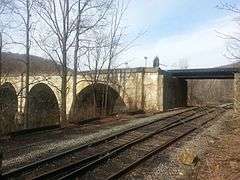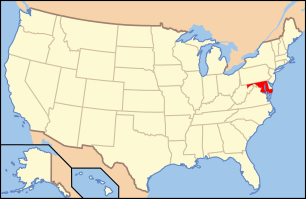Bloomington Viaduct
|
Bloomington Viaduct | |
|
Bloomington Viaduct in January 2014 | |
  | |
| Location | Bloomington, Maryland |
|---|---|
| Coordinates | 39°28′38″N 79°4′5″W / 39.47722°N 79.06806°WCoordinates: 39°28′38″N 79°4′5″W / 39.47722°N 79.06806°W |
| Built | 1851 |
| Architect | Baltimore and Ohio Railroad |
| Architectural style | Other |
| NRHP Reference # | [1] |
| Added to NRHP | November 21, 1976 |
| Bloomington Viaduct | |
|---|---|
| Carries | Railroad |
| Crosses | North Branch Potomac River |
| Locale | Bloomington, Maryland and Mineral County, West Virginia |
| Maintained by | CSX Transportation |
| Characteristics | |
| Design | Stone arch |
| Material | Sandstone and concrete |
| History | |
| Constructed by | Baltimore and Ohio Railroad |
| Opened | 1851 |
The Bloomington Viaduct spans the Northern Branch of the Potomac River connecting Bloomington, Maryland to Mineral County, West Virginia. The sandstone railroad bridge features three full center arches, each with a 56-foot (17 m) span and a 28-foot (8.5 m) rise. It is owned and operated by CSX Transportation on its Mountain Subdivision.
History

When built in 1851, it carried a double track of the original Baltimore and Ohio Railroad main line. In 1916 the viaduct was widened to accommodate two more tracks. The addition is a Melan-type reinforced concrete bridge of identical configuration built against the south face of the original stone bridge.[2] As the state boundary follows the southern bank of the Potomac, nearly all of the bridge is located in Garrett County, Maryland.
The Bloomington Viaduct was listed on the National Register of Historic Places on November 21, 1976.
References
- ↑ National Park Service (2007-01-23). "National Register Information System". National Register of Historic Places. National Park Service.
- ↑ Ronald Andrews and Pamela James (August 1975). "National Register of Historic Places Registration: Bloomington Viaduct" (PDF). Maryland Historical Trust. Retrieved 2016-01-01.
External links
- Bloomington Viaduct, Garrett County, including photo in 1975, at Maryland Historical Trust


